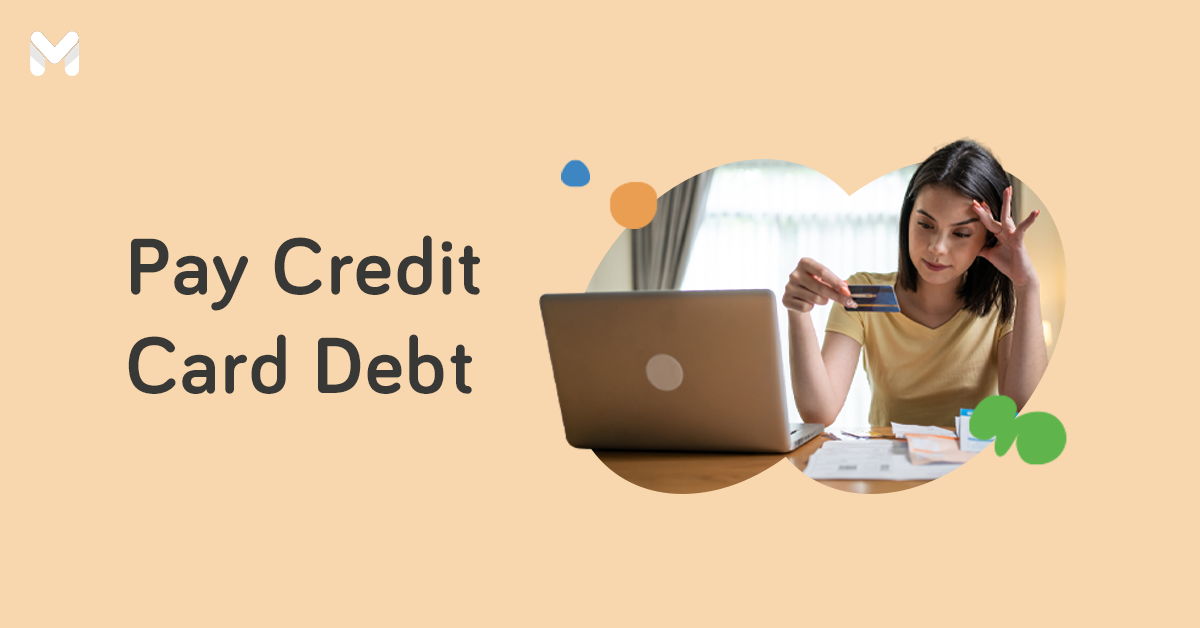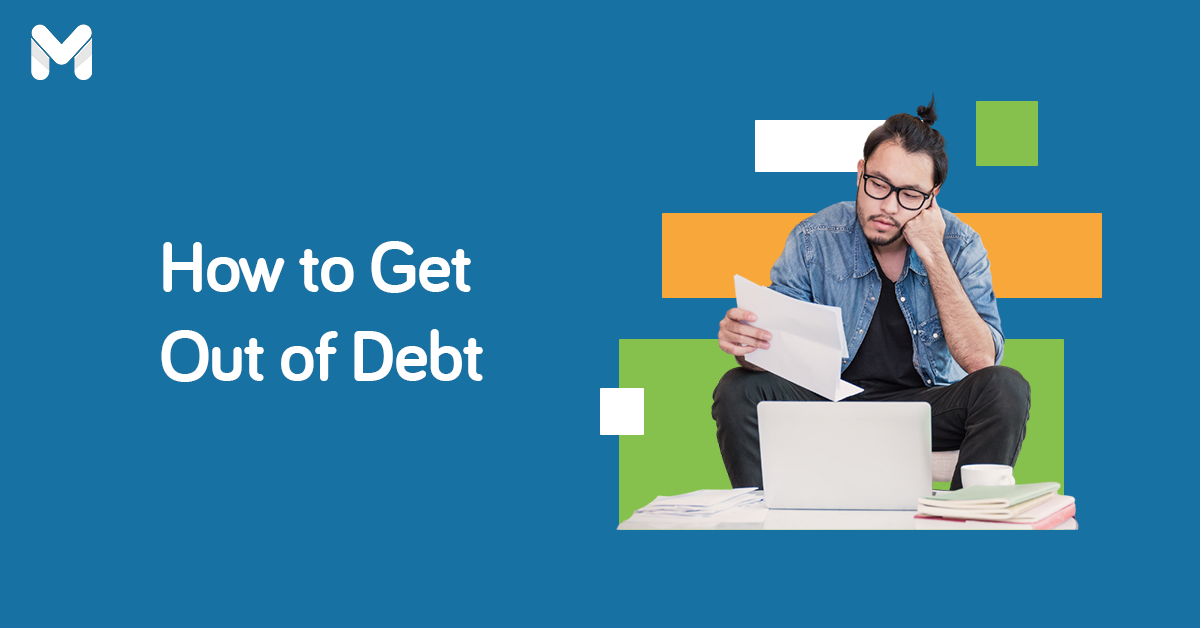Paying off debts may sound easy for those who earn more than the minimum wage. But what if you live from paycheck to paycheck and barely have enough left to settle outstanding debts?
Dealing with debt when you have little money to spare is difficult. Ultimately, however, what matters is your will to break free from the agony of debt repayments.
In this article, learn how to pay off debt fast with low income.
The Problem: A High Debt-to-Income Ratio
A borrower usually drowns in debt because of a high debt-to-income ratio. From there, things begin to spiral out of control.
✏️ How to Calculate Your Debt-to-Income Ratio
-Jun-11-2024-10-52-29-1751-AM.png?width=617&height=411&name=Pics%20for%20blog%20-%20600x400%20(7)-Jun-11-2024-10-52-29-1751-AM.png)
In a perfect world, the ideal debt-to-income ratio[1] is 36% of your income. Look at the formula below:
(Total monthly debt payment ÷ Gross monthly income) x 100 = % Debt-to-income ratio
Here's a sample computation based on the assumption that you have ₱10,000 in monthly debt payments and an income of ₱30,000:
₱10,000 ÷ ₱30,000 x 100 = 33.3%
After making your monthly debt payments, you’ll have only ₱20,000 left to pay for taxes, government contributions, utility bills, and necessities.
Let's say your utility bills cost an average of ₱3,000, your food spending ₱6,000, your rent ₱4,000, transportation ₱3,000, and your total monthly deduction for contributions and tax ₱3,000. You'd only have ₱1,000 left.
This shows you can no longer apply for additional debt because it will be impossible for you to pay off using the remaining money you have each month.
Banks consider your debt-to-income ratio whenever you apply for a loan. Anything higher than the ideal 36% means a possible loan default or difficulty settling monthly payments on time.
Before applying for a loan, do the math. Calculate the total of monthly installments you need to pay. If your debt-to-income ratio goes beyond the ideal 36%, look for other alternatives.
If you fail to calculate your debt-to-income ratio, you might grab every borrowing opportunity—whether or not you have the money to pay for it. You don't want to realize too late that your income can't cover your liabilities.
Read more: Becoming Free of Debt: Why You Should Start Paying Your Debts Now
What Causes Borrowers to Stay in Debt?
-Jun-11-2024-10-55-25-3844-AM.png?width=600&height=400&name=Pics%20for%20blog%20-%20600x400%20(8)-Jun-11-2024-10-55-25-3844-AM.png)
Aside from not computing their debt-to-income ratio, a lot of Filipinos borrow from banks and loan sharks for a few bad reasons, including the following:
❗ Debt Repayment is Not a Priority
A lot of people stay in debt because they prioritize other things. They tend to forget that debt repayments become more expensive when they're delayed.
❗ No Budget Plan
According to author Natalie Pace, a debt problem is, at its core, a budgeting problem. People who don’t prepare a budgeting plan usually get into debt because they don’t know how to allocate their finances.
A budget will help you manage your money and control your spending. With good financial planning, you'll know how to pay off debt—whether it's a credit card or a cash loan—fast.
❗ Uncontrolled Spending
To control your expenses and prevent impulse buying, prioritize your needs. If you don’t make a list of things you need to buy, you'll end up paying for items you don't need.
❗ Need to Keep Up with Trends
Your neighbor bought a smart TV during an online sale. Because you don't want to miss out, you got one too, even if it wasn't on sale anymore.
Struggling to keep up with trends can be very costly, leading to more debts than initially planned.
Read more: Dear Lender: Go Easy on Me! It’s Pandemic and I’m Bankrupt, er, Insolvent
6 Best Ways: How to Pay off Debt Fast With a Low Income
-Jun-11-2024-10-57-47-0096-AM.png?width=620&height=413&name=Pics%20for%20blog%20-%20600x400%20(9)-Jun-11-2024-10-57-47-0096-AM.png)
In the Philippines, consumer loans increased from ₱1.12 trillion in 2022 to ₱1.69 trillion in November 2023, mostly for the purchase of basic goods.[2]
You need to buy these goods to survive—that's understandable. However, you also need to realize that the sooner you’re done with paying it off, the better.
Whether it’s credit card debt or cash you borrowed from a relative or a friend, remember you made an agreement to pay your debt. You need the will to kick off your debt repayment journey and break free from debts immediately.
So how to pay off debt faster, even with low income? Follow these steps:
Step 1: Evaluate Your Situation
Determine your financial situation. How huge is your debt and how much money will you need each month to pay for it?
Next, account for all your expenses—even little things from transportation allowance to the cheap snacks you buy every now and then. You should build an accurate and realistic budget to start paying off your debt.
Step 2: Reduce Unnecessary Expenses
Make sure your money isn’t wasted on unnecessary stuff. Reduce your expenses by evaluating which expenses you can forego.
Are you subscribed to an online service you haven't used in the last two months? Are you spending on clothes even when you haven’t worn the new items you just bought? Do you frequently order food online?
This way, you can better manage your income and make enough room to pay your debts.
Step 3: Create a Spending Plan
Next, create a spending plan to ensure you pay off your debt first. Allot a large percentage of your monthly salary toward debt repayment.
For example, let’s say you earn ₱12,800 after taxes every cut-off and have a debt of ₱45,000. Set aside ₱5,000 of your salary for debt payments every month.
That said, keep in mind that you still have recurring expenses to deal with: rent, utilities, groceries, and allowance for commuting, to name a few.
- Debt payment: ₱5,000
- Recurring expenses:
- Rent: ₱3,300
- Utilities: ₱1,000
- Groceries: ₱1,500
- Transportation: ₱1,000
- Spending money: ₱1,000
- Total: ₱12,800
Since your income is low, you might need to pause on saving money first. Paying off debt and saving at the same time is doable, but difficult.
For now, focus on how to pay off debt. Start saving again once you clear your debts.
Step 4: Find an Additional Source of Income
An alternative is to find a second income stream. Get a part-time job or work freelance. Your income will depend on how much work you’re willing to take on.
Remember to manage your expectations, though. But if your goal is to earn a little more, even minimal compensation can still make a difference.
You may also want to tap into your talents or skills. For example, if you have the cooking prowess, start creating baked goodies to sell online.
Step 5: Don’t Get New Debt
As much as possible, stop borrowing. New debts mean higher monthly payments. Refrain from acquiring additional loans to be paid until existing debts are settled.
Step 6: Consider Debt Consolidation or Balance Transfer
Not all new debts are bad, though. Some banks offer balance transfers on credit cards and debt consolidation on personal loans—a huge relief if you have debts from different lenders.
A credit card balance transfer allows you to pay off all your outstanding balances with just one credit card—usually at a lower interest rate. Check out these options:
| Credit Card | Balance Transfer Features |
|
UnionBank Platinum Mastercard
|
|
|
Metrobank Titanium Mastercard®
|
|
|
HSBC Red Mastercard
|
|
|
Security Bank Gold Mastercard
|
|
|
BPI Edge Card
|
|
On the other hand, use a debt consolidation loan to pay off debt if you wish to lower the costs and/or the number of monthly installments. For this, look into the UnionBank Personal Loan:
🎁 Get a chance to win a 4D3N travel package and other prizes worth ₱350,000 with a UnionBank Personal Loan
Promo period: Until May 31, 2025
Make your personal loan even more rewarding! Apply for a UnionBank Personal Loan via Moneymax and earn 1 raffle entry for our biggest summer giveaway. Get a chance to win a 4D3N trip for 2 to Boracay, Coron, or Puerto Princesa! Plus, win more prizes worth up to ₱350,000! Minimum loan amount of ₱20,000 is required to qualify for a raffle entry.
Per DTI Fair Trade Permit No. FTEB-220354. Series of 2025. Terms and conditions apply.
Read more: Until “Debt” Do Us Part? What You Should Know If You're Marrying Someone with Debt
Final Thoughts
Every debt repayment journey requires sacrifice, especially if you’re used to rewarding yourself each month. But every time you feel tempted to spend on non-essentials, imagine how peaceful your life will be once you pay off your debts.
So how to pay off debt fast with low income? Although your salary does matter, it still largely depends on your willpower.
You can do it. Good luck!
Sources:
- [1] Debt-to-Income (DTI) Ratio: What’s Good and How to Calculate It (Investopedia, 2024)
- [2] Consumers in the Philippines take on more debt, save less (ING, 2024)












_1200x350.png?width=751&height=219&name=UB_PL_Generic_2_(Jan_2025)_1200x350.png)
_1200x350.png?width=734&height=214&name=UB_PL_Golden_Giveaway_-_Main_KV_(April_2025)_1200x350.png)

.png)

